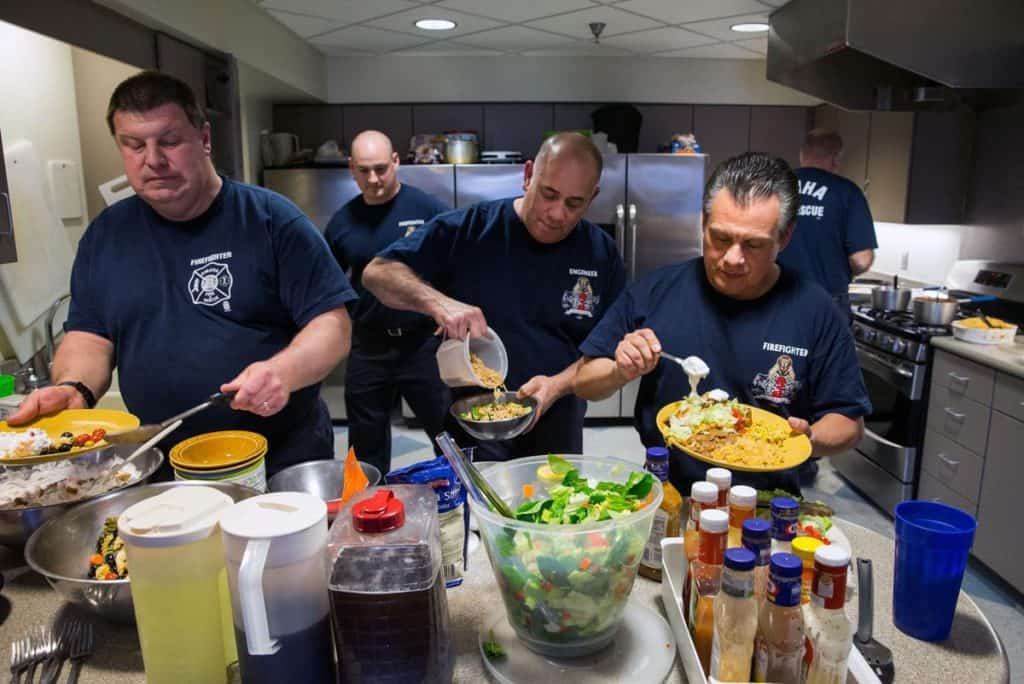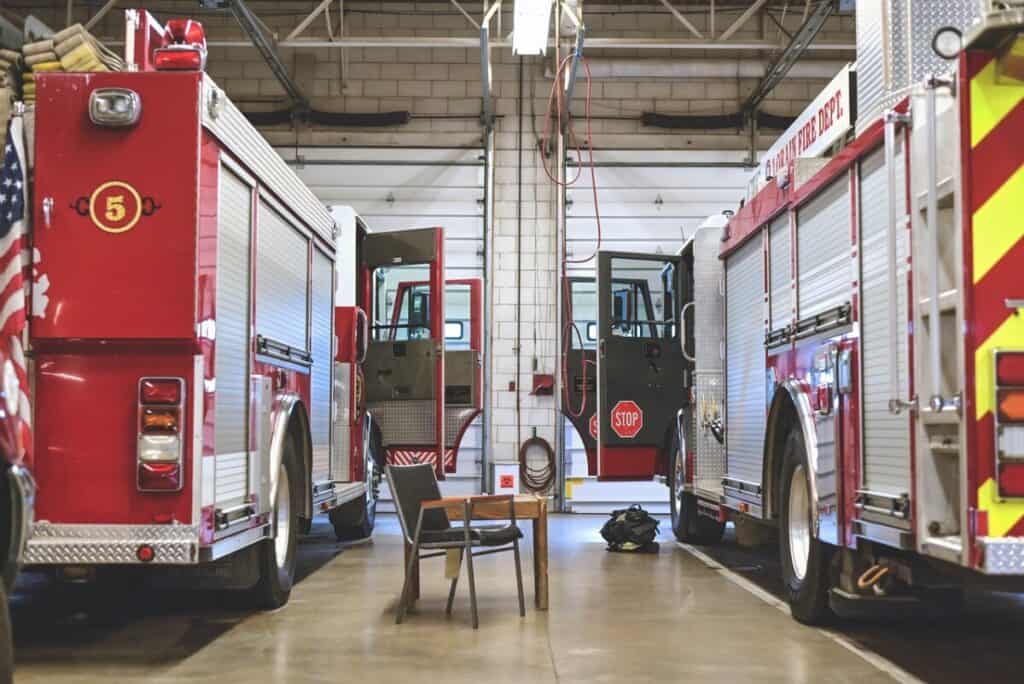
What is a day in the life of a career firefighter like? Living in the fire station for 24 to 48 hours straight? I’m asked this question often and the answer may surprise you. As a career firefighter, you will typically work a 24 hour shift schedule. The shift is often busy and often hectic. There is the constant challenge of meeting the non emergency needs and responsibilities while always being ready to respond to an emergency call.
I know this may surprise you, but we don’t sit around all day playing cards and watching TV as many of the popular TV shows tend to portray. A Firefighter shift is a well planned, task filled day that is more structured and disciplined than you might think. But honestly it’s not all work. Firefighters are a tight group of individuals that enjoy the station life and like to have fun and enjoy their time while on duty.
Shift Change! Starting Your Day as a Career Firefighter
Shift schedules and start times differ from department to department. I worked most of my career in what was commonly known as a modified Kelly schedule which consisted of 24 hours on then 24 hours off ending with 4-days off after a rotation of 3 work shifts. Sounds confusion? I know it can be but you get used to it pretty quick. It looks like this: 24 hours on, 24 hours off, 24 hours on, 24 hours off, 24 hours on, then 4 days off. For a better understanding of the different types of firefighter work schedules check out my post on this topic by clicking this link. Understanding the firefighter work schedule.
For me, shift change was at 7:00 am. Typically you would arrive 15 minutes before shift change. Change into your uniform and put your Firefighter protective gear on the truck you’re assigned to. At this point you would meet with the person you are relieving, let them know they are cleared off the truck and then go over any issues or needs from the previous shift. This could be information about equipment that is out of service or about needs on the truck such as replacing medical supplies.
The first hour after shift change is usually pretty hectic. There are a lot of firefighters coming and going and issues being addressed from the shift before. There is also work being done to insure everything is ready for the next emergency response.

Next, Truck Checks! Ensuring Everything is Ready.
Morning Truck checks. This is usually the first task at hand after the new shift had relieved the previous shift. I compare this to a pilot doing his preflight inspection before taking off. It is also just as important. Mistakes here or complacency can have fatal results for you, your fellow firefighters, as well as the customers you serve. An empty oxygen cylinder could delay the care and treatment of a heart attack victim. An Empty or low Self Contained Breathing Apparatus air tank can stop you from making a rescue. Truck checks are important and professional firefighters take them very seriously.
Without going into every detail of the truck check, understand that after checking your own personal protective equipment, PPE, you will assist in helping to complete the checks on all the trucks and response equipment in the station.
Morning Brief, What is the plan for the day?
Once truck checks are competed everyone would meet in the day room for morning briefing from the company officer. We usually did this over a light breakfast around the dinner table. The Company officer would inform the crews of training for the shift, any public education events, inspections and other duties needing to be completed for the day.
As you can imagine, the schedule is always flexible. Emergency calls obviously take priority over any non-emergency event or training. The only exception is for training or events that can’t be missed such as recertification training. In these situations the crew will be taken out of service and another crews from the station, or another nearby station will cover calls for this crew.
Station Duties, Cooking Again!
After truck checks and morning briefing are completed it’s time to take care of the house we will be living in for the next 24, to 48 hours.
Each Firefighter will be assigned a task or tasks for the day. This might be washing the fire equipment, cleaning the floors and bathrooms, or being the cook for the shift. This may include making up your sleeping areas for the shift. Many departments will “hot bunk” meaning they share their bed with the other shifts. This means your will need to places your bedding on an open rack.
Speaking of cooking for the shift. First, yes we pay for our own food. Everyone thinks the city pays for our meals, not so. Second, yes everyone shares in the cooking duties. Typically a rotation is set up and when it’s your turn to cook you decide what to make, collect the money during briefing for the food then head to the grocery store with your crew to complete the shopping. Cooking for a new firefighter can be stressful but you will quickly learn what you enjoy making and how to get it done.
The bottom line is this is your home for the shift you want it clean and functional. You also want to take pride in the station and make sure its looking great. You never know when a tour might happen or a chief might stop by.
Workout and Training

Physical fitness is a top priority for firefighters. we have learned from our past in that the number one killer of firefighters is heart attacks. I often tell people that the most physically demanding situation I have ever been in was on the fire ground. The demands on a firefighter’s body during a structure fire are more intense than any sport or event I have every done.
How I motivated myself to workout daily was I told myself I was there to be a part of the solution. I never wanted to contribute to be problem by not being able to physically complete my task or worse become part of the problem by going down at a fire scene. This is a tough dangerous job at times. Being physically fit is vital.
Oftentimes what separates us from being the firefighter we are and the firefighter we want to be is our mindset. Our mindset is the foundation of a lifestyle that is in line with whom we want to become. It keeps us disciplined to do the necessary daily work to uphold our end of the deal – the oath
Down time? After hours in the station.
Yes, there is some time to relax at the fire house. As we discussed earlier the, days are busy with inspections, maintaining the trucks and station, public events, and training along with running calls. However, the evening, after dinner there is time to relax, watch some television and enjoy the friendship that is unique to the firefighter community. This is often when you will find firefighters working on personal projects, studying for promotional, and spending time on the phone with family.
In Can’t Hurt Me, he shares his astonishing life story and reveals that most of us tap into only 40% of our capabilities. Goggins calls this The 40% Rule, and his story illuminates a path that anyone can follow to push past pain, demolish fear, and reach their full potential.
Self study and personal improvement.
I wanted to touch more on the self and career improvement. Promotional testing is a normal part of most firefighter careers. The promotional process with most fire departments are very competitive. Preparation and training will help you to succeed in your career. I would strongly suggest that you strive throughout your career to promote and improve. Becoming an officer was one of the most rewarding times in my career.
Striving for higher education. Many departments and cities provide continuing education incentives. I would highly recommend that you take advantage of any opportunity to take classes and pursue an associate or bachelor degree.
Sleeping at the Station

Sleep is a relative term at the station. Trying to get good quality sleep while knowing you will probably be wakened several time is a challenge. I had a chief describe it as lying in bed knowing someone is going to hit the bottom of your feet with a yard stick, at some point during the night, “now try and go asleep”. I think a better way to describe sleeping at the station as getting a nap or resting between calls.
End of Shift
After your shift has been completed it’s time for you to be relieved by your fellow firefighter from the oncoming shift. You never leave shift until you’ve been relieved by your coverage. You will then report to to your relief things that are needed and any changes that happened during your shift. This exchange usually only takes a few minutes. You then remove your gear from the truck and are cleared to leave the station.
I really enjoyed my time as a line firefighter on shift. You take great pride in serving your community while making close friends and doing what you love.
Enjoy your career!


